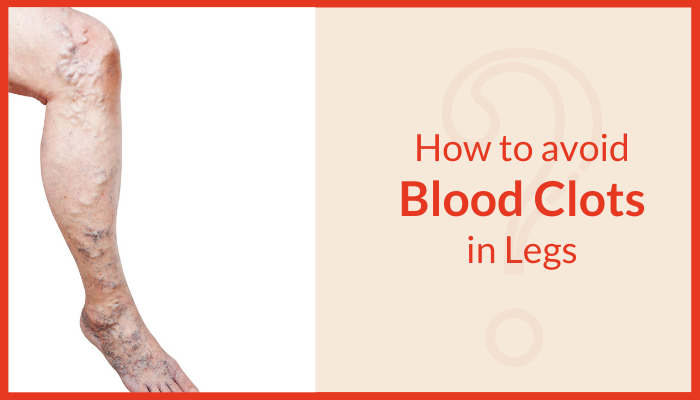“Blood clots in legs — how bad it can be?”
Blood clots are not always life-threatening, but they can be and we do not want to put ourselves at risk.
These blood clots can break off, pass through our blood circulatory system and get stuck in our lungs, which means we are dealing with a potentially fatal situation known as pulmonary embolism.
Blood clots are not something to take easy. They exist deep in our veins, particularly in the legs and are often referred to as deep vein thrombosis (DVT).
We may do different things in our life that could put us at risk of developing blood clots and possibly further fatal issues. But, some simple changes can help rid of these blood clots.
How to avoid blood clots in our legs – Have a glance
1.Give time to move our body
Sitting for prolonged periods of time without any movement is one of the major risk factors for deep vein thrombosis. But hopefully, you can lower that risk with a quick and simple tip.
To keep our circulation going, we need to lift our legs especially if we already have issues with our veins.
2. Stay hydrated while traveling
It is easy to get dehydrated while we are travelling.
If we are sitting for more than 2 hours either in a car or on a plane, then we are increasing our risk of blood clots. If traveling by car, try to stop every hour to hour and a half, get out and walk around. If we are confined by the walls of an airplane, get up and walk around the aisles as often as we can to keep things moving.
To help prevent blood clots while travelling, we can do calf pumps and write the letters of the alphabet using feet.
When traveling, we must stay away from drinks (such as caffeine, alcohol and sugary drinks like soda) that will dehydrate us even further.
To avoid blood clots in our legs while traveling, we must carry compression stockings. It is preferable to have them prescribed to us by a vein specialist.
3. Keep moving when pregnant
Pregnancy and changes in hormones are one of the primary risks of blood clots, so this is a good time where we are not living a sedentary life. Pregnancy increases the pressure in the veins of your pelvis and legs. During bed rest, our legs remain still for long periods and our calf muscles do not contract to help blood circulate, which can increase the risk of blood clots.
Make sure we are not limiting ourselves to the couch/sofa or bed for too long without moving. Try to walk at regular intervals.
During pregnancy, blood flow might be more difficult, hence try sleeping on the left side to help improve blood circulation.
4. Raise legs when sleeping
We must try to elevate our legs while sleeping to help proper blood circulation. Yes, we can do this by putting a pillow under our feet or by raising the foot just a few inches will greatly help our circulation and reduce our risk of blood clots.
Tip: Make sure that our legs are higher than our hips in order to get the full effect.
5. Signs of a Blood Clot – Notice them
If we notice anything unusual, be sure to schedule an appointment with a vascular surgeon. Never leave untreated the blood clots — as they have the potential to be life-threatening.
Worried about blood clots in your legs?
Consult Dr. Abhilash Sandhyala, vascular surgeon and interventional radiologist in Hyderabad, who had performed around 1500 surgeries successfully and gave consultations to around 5500 patients.
If you are suffering from blood clots or varicose veins and looking for a treatment, you can visit
Flow Vascular clinic
H.No: 2-22-298/2/A,
Sree Krishna Diagnostic Center Building,
2nd Floor, Beside Kalamandir,
KPHB Main Road, Kukatpally,
Hyderabad.

